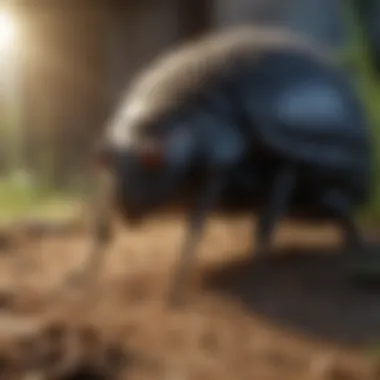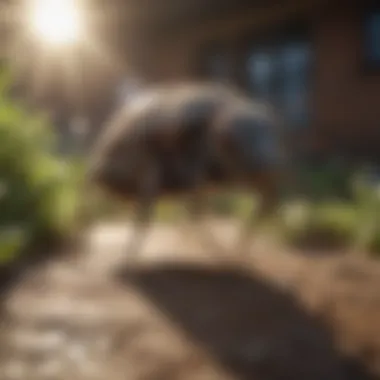Effective DIY Pest Control Tips for Spartanburg Residents


Intro
Pest control is a critical aspect of maintaining a healthy environment in Spartanburg, South Carolina. As the region has its unique climate and ecosystem, the approach to managing pests must be tailored appropriately. This guide serves as a comprehensive resource, enabling residents to take control of pest issues effectively without relying solely on commercial solutions.
Understanding the types of pests prevalent in Spartanburg is essential. Local homeowners face challenges from insects such as ants, termites, and mosquitoes, alongside critters like rodents. Each presents distinct problems that need specific methods of control.
This guide covers various methods that are not only effective but also environmentally responsible. By utilizing simple tools and home remedies, residents can address pest issues proactively. It is vital to consider preventive measures as well, which can significantly reduce the likelihood of infestations before they start.
Current Trends in Agriculture and Horticulture
As interest in sustainable living grows, innovative trends in agriculture and horticulture are gaining momentum. Homeowners in Spartanburg can benefit from these developments as they explore DIY pest control solutions.
Overview of Recent Innovations
Recent innovations include the use of natural repellents derived from plants. Essential oils, such as peppermint and eucalyptus, have shown effectively in keeping specific pests at bay. Moreover, the rise of integrated pest management approaches emphasizes a combination of biological, cultural, and mechanical tactics.
Sustainable Practices Gaining Popularity
Sustainable practices are particularly resonating with homeowners aiming to minimize chemical use. Techniques like companion planting help create a balanced ecosystem in gardens and yards. Certain plants can repel undesirable pests while attracting beneficial insects. This not only aids pest control but also enhances plant health.
"Sustainable pest control encourages a healthier living environment, aligning with the desires of modern homeowners."
Essential Farming Techniques
For effective pest management, understanding essential farming techniques is crucial, even for residential gardens.
Soil Health Management
Healthy soil contributes significantly to pest resilience. Implementing composting can improve soil quality, enhancing plant vigor. Healthy plants are less susceptible to pest infestations. Test soil regularly to ensure optimal pH levels and nutrient balance.
Pest and Disease Control Strategies
The application of traps and barriers can effectively keep pests away. Homemade traps using vinegar or soapy water can attract and capture various pests. Diatomaceous earth is another useful tool, effectively controlling soft-bodied insects while being safe for pets and humans.
Tools and Technology in Farming
Recent advancements have also influenced pest control methods. Homeowners need to stay updated on useful tools and technologies that simplify pest management tasks.
Overview of Advanced Farming Tools
Tools such as insect vacuums or digital pest monitoring systems allow for proactive intervention. These innovations enable users to identify infestations in their early stages, allowing for timely action.
Case Studies on the Use of Technology
Several case studies reveal successful applications of technology in pest control. For example, homeowners using smartphone apps for identification and monitoring report higher success rates. This tech-savvy approach allows for a more informed strategy in pest management.
Foreword to DIY Pest Control
Managing pests can often be a daunting task, especially for homeowners in Spartanburg, South Carolina. However, DIY pest control offers a practical and effective solution. This section discusses the vital aspects of engaging in pest management independently.
Understanding Pest Control Basics
To effectively combat pest issues, one must first grasp the fundamentals of pest control. Pest control focuses on minimizing the impact of unwanted organisms on agricultural and residential environments. An understanding of the pest lifecycle, habits, and habitats is crucial. This knowledge helps in selecting the most appropriate treatment methods. For instance, identifying whether the pest is a seasonal nuisance or a persistent threat can guide the approach taken.
Effective pest control requires an integrated pest management (IPM) strategy. This often includes monitoring populations, establishing thresholds for action, and selecting methods based on effectiveness and environmental impact. Familiarizing oneself with these elements lays the groundwork for successful pest management.
Importance of DIY Methods


Engaging in do-it-yourself pest control practices provides multiple benefits. Firstly, it empowers homeowners by giving them control over pest issues in their environment. This can lead to cost savings, as professional services may incur high fees. Additionally, DIY methods often focus on using environmentally friendly products, promoting sustainability within the community.
Another important aspect is the immediacy of response. When a pest issue arises, delays can exacerbate the problem. DIY solutions enable quick actions, preventing minor annoyances from escalating into serious infestations.
Moreover, learning and applying pest control methods can enhance one’s understanding of the local ecosystem. It encourages a proactive mindset regarding household maintenance and environmental health. Thus, examining and adopting these methods can cultivate a sense of responsibility towards one's habitat and community.
"The ability to manage pests effectively is a skill that can greatly enhance the quality of life for any homeowner."
In summary, grasping the core concepts of pest control, coupled with the empowerment of DIY methods, creates a solid foundation for successful pest management in Spartanburg.
Common Pests in Spartanburg
Understanding the common pests that inhabit Spartanburg is imperative for effective DIY pest control. Knowing these pests and their behaviors helps individuals take proactive measures to manage infestations before they escalate. This knowledge also promotes a healthier living environment, as many pests can pose significant health risks to residents.
Recognizing Household Pests
Household pests are a frequent concern for homeowners in Spartanburg. These pests often invade homes in search of food, water, and shelter. Common household pests include:
- Ants: Ants are social insects that can form large colonies. They commonly enter homes seeking food. Carpenter ants may cause structural damage by hollowing out wood.
- Cockroaches: These pests are known for their resilience. They can carry diseases and trigger asthma. Their presence indicates unsanitary conditions.
- Bed Bugs: Bed bugs thrive on blood and can lead to uncomfortable bites. They often hide in mattresses and bedding.
- Rodents: Mice and rats are notorious for infiltrating homes. They can contaminate food and damage property through gnawing.
Identifying these pests early can prevent more severe issues down the line. Homeowners should look for signs such as droppings, nests, and bite marks to recognize an infestation.
Pests Specific to Spartanburg
Spartanburg's climate and environment give rise to certain pests that are particularly prevalent in the region. Some notable pests include:
- Termites: These wood-eating insects are a severe threat to homes in Spartanburg. They can cause significant structural damage if not addressed promptly.
- Wasps: Wasps can be aggressive, especially during late summer. Their nests are often found in sheltered areas, posing a risk to people nearby.
- Fleas: Fleas are common in homes with pets. They can lead to discomfort for both pets and humans and are difficult to eliminate.
Understanding these pests helps tailor specific control methods. For instance, homeowners near wooded areas may need to focus on termite prevention, while those with pets should prioritize flea management.
"Proper identification of pests is the first step in an effective pest management strategy."
Awareness of the common pests in Spartanburg empowers residents to act decisively. Developing a robust pest control plan starts with knowledge.
Preventive Measures
Preventive measures are the first line of defense when addressing pest control issues. By adopting tailored strategies, residents of Spartanburg can significantly reduce the likelihood of pest infestations. These methods emphasize proactive actions rather than reactive ones, ensuring that pests do not become a major issue in the first place. The benefits of implementing preventive measures include a decrease in pest-related damages, reduced use of chemicals, and an overall healthier living environment.
Sealing Entry Points
Sealing entry points is an essential preventive measure in pest control. Many pests can enter homes through small cracks and gaps in walls, around windows, or even through utility lines. Taking the time to inspect your home for potential entry points can save you from future headaches.
To seal these gaps, you can use caulk or weather stripping. Pay attention to doors and windows, as pests often utilize these routes. Make sure that all screens are in good condition and fit snugly.
Following these steps not only decreases the chances of pest entry but also improves energy efficiency, which is an added benefit.
Proper Food Storage
Proper food storage plays a vital role in preventing pest infestations, especially in the kitchen. Pests are attracted to food sources, and if food is left out or stored improperly, it becomes an easy target. Protecting food involves several deliberate actions.
- Store perishable items in the refrigerator.
- Keep dry foods, like grains and cereals, in airtight containers.
- Discard expired items promptly.
- Regularly clean pantry shelves to remove crumbs and spilled food.
By maintaining a well-organized and clean kitchen, you can greatly reduce the attraction for pests. This simple yet effective habit can deter unwanted visitors from making your home their habitat.
Maintaining Clean Environments
Fr maintaining clean environments is crucial in the fight against pests. A tidy home not only looks better but also acts as a deterrent to various pests that thrive in clutter and filth.


Regular cleaning routines should include:
- Vacuuming floors to remove crumbs and debris.
- Wiping counters and tables to maintain hygiene.
- Decluttering spaces to eliminate hiding spots.
- Cleaning up after pets to avoid attracting pests.
By adopting a consistent cleaning schedule, you can discourage pest populations from establishing themselves in your home and ensure a healthier living space for you and your family.
Remember: Prevention is always more effective and economical than treatment. By implementing these measures, you can save yourself from future pest control problems.
DIY Pest Control Methods
DIY pest control methods are vital for homeowners in Spartanburg, SC, looking to manage pest issues efficiently. These techniques can save both time and money while minimizing reliance on commercial pest control services. By understanding and implementing effective DIY strategies, homeowners can address infestations without harsh chemical treatments, leading to a healthier living environment.
Chemical Treatments
Chemical treatments involve the use of pesticides to eliminate pests. These substances can be effective, but they require careful consideration. Homeowners must choose the right product for the type of pest and apply it according to the manufacturer's instructions. Common chemical treatments include insect sprays, granules, and baits.
When selecting a pesticide, consider the effectiveness against specific pests, the active ingredients, and environmental safety. Always read the label for safety guidelines and precautions. It's also essential to evaluate potential health risks to household members and pets. Using chemical treatments responsibly can yield positive results without adverse effects on health.
Biological Control Strategies
Biological control strategies leverage natural predators or competitors to manage pests. This method can be particularly effective in maintaining a balanced ecosystem within your garden. For instance, introducing ladybugs can help reduce aphid populations, or using parasitic wasps can control caterpillar populations. This approach not only targets the pest but also strengthens biodiversity in the area.
Another aspect of biological control is the use of beneficial microorganisms. Bacteria like Bacillus thuringiensis (Bt) can target specific pests while minimizing harm to non-target species. Implementing these methods often leads to long-term pest management without the adverse effects associated with chemical pesticides. They promote a healthier environment and enhance soil and plant health.
Physical Barriers and Traps
Physical barriers and traps provide a tangible method of pest control. This approach includes using nets, screens, or other devices to prevent pests from accessing homes and gardens. For example, installing fine mesh screens on windows and doors can keep insects out while allowing ventilation.
Traps are another integral part of physical pest control. Various types of traps are available, including sticky traps for insects and bait traps for rodents. The effective placement of these traps can significantly reduce the pest population over time. Regular monitoring of traps is crucial to assess effectiveness and make necessary adjustments.
Implementing physical barriers and traps not only addresses immediate pest issues but also contributes to ongoing pest prevention. This method is often less harmful to the environment compared to chemical alternatives, making it a favorable option for eco-conscious homeowners.
Tools and Resources for DIY Pest Control
In the realm of DIY pest control, having the right tools and resources can significantly impact the effectiveness of your efforts. Not only do they make pest management more efficient, but they also empower homeowers to tackle issues with confidence. This section will delve into the essential tools that aid in pest control, as well as valuable online resources and communities that can provide support and sharing of knowledge.
Recommended Tools
When it comes to DIY pest control, a well-equipped toolkit can be your best ally. Here are some essential tools that every homeowner should consider:
- Sprayers: A good quality sprayer is vital for applying pesticides and other solutions evenly. Choose one that allows for adjustable nozzles based on the type of application needed.
- Traps: Different pests require different types of traps. For instance, mouse traps, sticky traps for insects, and even specialized traps for larger pests like raccoons or possums can be essential.
- Insecticides: Selecting the right insecticide is crucial. Always opt for pest-specific options to minimize environment impact and maximize results.
- Protective Gear: Safety should never be overlooked. Gloves, masks, and goggles protect you from chemicals as well as pest bites.
- Sealing and Repair Tools: Tools like caulk guns, wire mesh, and patching supplies are indispensable for sealing entry points and preventing pest access.
These tools will enable homeowners to approach pest control systematically and effectively. Having the right equipment not only enhances performance but also reduces the risks associated with DIY efforts.
Online Resources and Communities
The internet is a treasure trove of information for DIY pest controllers. Several online platforms and communities can offer support, ideas, and shared experiences. Here are some notable resources:
- Wikipedia (en.wikipedia.org): A good starting point for understanding various pests, their biology, and behaviors. It can provide a solid background before tackling an infestation.
- Britannica (britannica.com): Offers in-depth articles on pest control methods, scientific explanations, and environmental impacts, which can be useful for responsible practices.
- Reddit (reddit.com): Subreddits dedicated to pest control and gardening where people share their experiences and solutions. Subscribing to these communities can help you understand local pest issues in Spartanburg.
- Facebook Groups: Search for local DIY pest control groups or gardening communities where members often share advice, tips, and recommendations that are relevant to Spartanburg residents.
Utilizing these resources can foster an informed approach to pest control, ultimately ensuring both personal safety and environmental responsibility.
Overall, combining the right tools with active online resources creates a comprehensive framework for effective DIY pest control. These elements equip homeowners in Spartanburg to manage their pest problems competently.
When to Seek Professional Help
Determining the right time to involve professionals in pest control can be challenging. DIY methods are beneficial for minor pest issues. However, some situations demand expert intervention. Knowing when to seek help is essential for effective pest management.


Identifying Severe Infestations
Identifying severe infestations can save time and prevent further damage to your home. Look for certain signs that indicate you may need professional help:
- Rapid Reproduction: If you notice an increase in pests in a short period, it signifies a breeding problem.
- Extensive Damage: Significant damage to furniture, wiring, or structural elements often points to severe pest activity.
- Resistance to Home Remedies: If common DIY techniques like traps or essential oils fail, the problem might be more complicated.
In Spartanburg, pests such as termites and rodents can cause substantial harm. If you suspect an extensive infestation, act promptly. Early intervention can lead to more efficient control and prevent costly repairs.
Health and Safety Considerations
Consider health and safety when assessing pest problems. Some pests can spread diseases that affect humans or pets. They can also trigger allergic reactions. Common issues include:
- Rodents: Known carriers of diseases like hantavirus and leptospirosis, they pose serious health risks when infesting homes.
- Bats and Birds: They may introduce histoplasmosis through their droppings; an infestation needs expert handling to avoid exposure.
- Bee Hives: Bees can become dangerous if disturbed. Professional beekeepers can remove these safely without harming the colony.
The use of chemicals in pest control can also raise concerns. Improper application can lead to toxic exposure. Professionals are trained in safety protocols, minimizing risks to your family and pets. For sensitive environments, such as homes with children or animals, this is crucial.
It is important to understand that while DIY methods offer some solutions, they may not be enough for severe or hazardous infestations.
Considering these elements helps make informed decisions. Prioritizing health and safety ensures that pest control measures effectively protect your home and well-being.
Legal and Environmental Considerations
Understanding the legal and environmental considerations of DIY pest control is crucial for homeowners in Spartanburg, South Carolina. This section covers the pertinent laws and environmental impacts associated with pest management strategies. Ignoring these aspects can lead to unintended consequences, both legally and ecologically.
State Regulations in South Carolina
In South Carolina, pest control is regulated to ensure the safety of both the public and the environment. Homeowners must be aware of the laws governing the use of pesticides and other pest control substances. The South Carolina Department of Pesticide Regulation enforces these laws. Here are some key points regarding state regulations:
- Licensing Requirements: Some pest control methods or products may require a licensed applicator. Homeowners should verify whether their chosen methods comply with state laws.
- Label Compliance: Pesticides must be used according to label instructions. This includes understanding the correct application methods and safety precautions.
- Notification Rules: Certain situations may require homeowners to notify neighbors or obtain their consent when using certain pest control measures, especially if the treatments pose a potential risk.
- Record Keeping: Maintaining records of pesticide applications may be necessary for compliance. Homeowners should track what was used, when, and in what quantity.
It's advisable for homeowners to familiarize themselves with these regulations to avoid penalties. They can access detailed information through the South Carolina Department of Pesticide Regulation website.
Impacts of Pest Control on the Environment
The environmental impacts of pest control practices are significant. Understanding these effects helps homeowners make informed choices about how to manage pests while minimizing harm to the environment. Here are some important considerations:
- Biodiversity Loss: Excessive use of pesticides can lead to a decline in non-target species, including beneficial insects, birds, and other wildlife. This loss of biodiversity can disrupt local ecosystems.
- Water Contamination: Runoff containing pesticide residues can contaminate local water supplies. This poses a risk not only to aquatic life but also to human health.
- Soil Health: Pesticides can negatively impact soil microorganisms essential for nutrient cycling. Healthy soil contributes to plant growth and overall ecosystem balance.
- Air Quality: Volatile organic compounds from certain pest control chemicals can evaporate into the air, affecting both air quality and human health.
"Environmental awareness in pest control can lead to more sustainable practices that protect ecosystems."
Homeowners should consider using organic methods or integrated pest management strategies that prioritize ecological health. Approaches that limit chemical use not only benefit the environment but also promote long-term pest control success.
For more information, the South Carolina Department of Pesticide Regulation website is a useful resource for understanding legal requirements. Additionally, platforms such as Wikipedia or Reddit might offer community insights on specific pest control practices.
Ending
In any examination of DIY pest control in Spartanburg, SC, the importance of a careful conclusion cannot be overstated. This section serves not just as a summary but as a pivotal point for the reader, encapsulating essential insights gained throughout the article. Understanding the core themes discussed empowers the homeowner to make informed decisions regarding pest management. It allows for a strategic approach to monitoring and controlling pest issues effectively.
Summarizing Key Points
From recognizing common pests in Spartanburg to implementing preventive measures, each segment of this guide contributes to a holistic understanding of DIY pest control. One must remember:
- Pest Identification: Knowledge of specific household pests allows tailored interventions.
- Prevention Strategies: Simple actions, like sealing entry points and proper food storage, dramatically reduce pest likelihood.
- Effective Control Methods: Both chemical and non-chemical methods have their place in pest management, depending on the severity of an infestation.
- Tools and Resources: Having the right tools and access to credible online resources enhances DIY efforts.
- Legal Considerations: Being aware of local regulations ensures compliance and promotes safe practices.
"Understanding both the biological aspects of pests and socially responsible practices leads to more sustainable pest management."
Encouragement for Responsible Practices
Promoting responsible practices in DIY pest control is vital for both personal safety and environmental integrity. Homeowners are encouraged to embrace eco-friendly methods wherever possible. This could include using natural repellents or traps that do not rely on harmful chemicals. Such practices mitigate ecological impacts while being effective.
Moreover, staying informed about local pest control regulations, the potential health risks associated with pest infestations, and safe handling of pest control products can lead to more beneficial outcomes. Acting responsibly not only aids one's immediate surroundings but also contributes positively to the broader community in Spartanburg.
Ultimately, cultivating a well-informed and strategic approach to pest management leads to successful outcomes and a more harmonious living environment.



